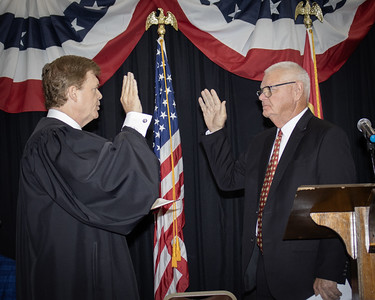Sid Salter Column
Published 12:00 am Tuesday, January 27, 2009

Sid Salter
When the 2008 special legislative session called to find a funding solution for a $90 million shortfall for the state’s Medicaid program ended in stalemate, Medicaid recipients worried about losing their benefits prayed for a miracle. They got one.
A special legislative session that began last May to address the issue cost taxpayers $607,872 and ended with no agreement between Gov. Haley Barbour and state lawmakers. Barbour, the two-term Republican, had wanted to increase provider assessments or the so-called “hospital tax.” Democratic House leaders wanted an increase in the state’s pitifully low cigarette taxes to be part of the deal. The result was the irresistible force meeting the immovable object. Neither side would budge.
Hospital tax, smoke tax
But at the 11th hour — miracle time — Barbour said that a “miscalculation” made during the Ronnie Musgrove administration and continuing through his term had resulted in the state paying more than it should have for Medicaid, the program that serves almost 600,000 Mississippians including the blind, the poor, the disabled and children.
Barbour said the miscalculation was discovered last May during the budget process and that the federal government would provide the state enough money to balance the Medicaid budget for the 2009 fiscal year — generating $88 million of the $90 million shortfall by increasing the gross revenue assessment on hospitals, which Medicaid can do without Legislative approval. The other $2 million was to be generated through cuts of less than 1 percent on other provider services.
In the fall, Barbour dropped his opposition to a “reasonable” increase in the state’s tobacco tax—but Barbour and House Democrats remain about 50 to 60 cents apart on their definition of “reasonable” as the House has passed a total $1 cigarette tax hike that’s likely DOA at the Senate.
The political landscape has changed since the 2008 regular session. The House leadership still wants a larger cigarette tax hike than Barbour and the state Senate are likely to accept.
Yet these days, House leaders aren’t talking about using the proceeds of a cigarette tax hike to pay for Medicaid. This year, in the depths of the most serious state fiscal situation in decades, the House leadership is talking about raising cigarettes taxes and raiding the state’s rainy day fund to benefit public schools.
‘Rainy day fund’ raiders?
After constitutionally mandated budget cuts made necessary by the state’s revenue shortfalls, House leaders now want to use most of the increase in tobacco taxes to make up the 3.50 percent cuts made to the Mississippi Adequate Education program appropriations — the basic funding mechanism for the state’s public schools.
Beyond that, some of those same lawmakers want to raid the state’s $368 million “rainy day fund” to make up the rest of the MAEP cuts — and they want to raid it deeper than Barbour and fellow Republican State Treasurer Tate Reeves say is fiscally prudent.
And what of funding the $90 million and growing Medicaid shortfall they didn’t fund last year?
Lawmakers have three choices: 1) Use the cigarette tax hike money and “rainy day fund” proceeds to hold the schools harmless from MAEP cuts; 2) Implement the “hospital tax” that hospitals were paying for years before last year’s political standoff developed over “taxing the sick” — something lawmakers and hospitals agreed willingly to do years ago; or, 3) Hope for another “miracle” like the “miscalculation” or paying for Medicaid with hurricane relief money or any of the other alternative sources they’ve used before.
But the $90 million shortfall’s still there.
(Contact Sid Salter at (601) 961-7084 or e-mail ssalter@clarionledger.com. Visit his blog at clarionledger.com.)





